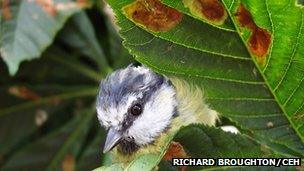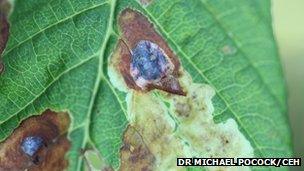Blue tits could tackle moth threat, scientists say
- Published

The moth causes distinctive brown patches of damage to the leaves of horse chestnut trees
Blue tits could offer hope in tackling damage done to conker trees by a non-native moth, according to scientists.
The horse chestnut leaf miner moth arrived in the UK in 2002.
The moth caterpillars disfigure the trees and cause them to produce smaller conkers, scientists in Hull and Oxfordshire said.
Experts believe finding out how many of the caterpillars are being eaten by birds would give information about how best to control the moth's spread.
The moth, Cameraria ohridella, has caterpillars that live inside leaves and form distinctive brown patches of damage called leaf mines.
Up to 700 leaf mines have been recorded on a single leaf and the damage caused by large numbers of larvae can be striking, scientists say.
'Big mission'
Experts at the Natural Environment Research Council's Centre for Ecology and Hydrology in Oxfordshire and at the University of Hull have asked volunteers to check leaves from horse chestnut trees.
Dr Michael Pocock, from the Centre for Ecology and Hydrology, said: "It's a big mission and we're reliant on people's help to discover how much birds are feeding on the alien moths."

Birds leave easily recognisable damage to areas of the leaf occupied by the moth caterpillars
Dr Pocock wants people to look for the distinctive damage caused by birds to the leaf mine homes of the moth caterpillars and report it through the Conker Tree Science website, external.
A previous experiment in 2011 discovered predatory wasps were not effectively controlling the alien moths and their rapid spread.
Dr Darren Evans, from the University of Hull, said: "The traditional game of conkers may be under threat, because trees infected with the alien moth produce smaller conkers.
"In discovering whether garden birds, like blue tits, can help to protect conker trees, we will also be learning more about the behaviour of the birds themselves."
- Published9 July 2011
- Published2 July 2011
- Published17 May 2011